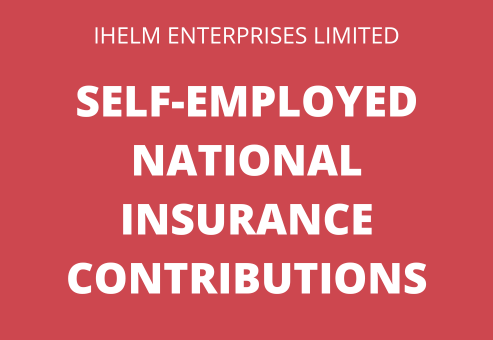During December’s Facebook Live, I talked about Self-Employed National Insurance Contributions and what self-employed businesses need to know about them.
Being self-employed comes with a unique set of responsibilities and benefits. One of the crucial aspects that every self-employed individual in the UK must understand is the National Insurance Contributions (NICs). Unlike salaried employees, self-employed individuals handle their own tax and National Insurance matters, which can seem daunting. This guide aims to simplify the process and explain what you need to know about self-employed NICs.
What are National Insurance Contributions?
National Insurance Contributions are payments made by workers and employers towards certain state benefits. These include the State Pension, Employment and Support Allowance, and Maternity Allowance, among others. For self-employed individuals, paying NICs is essential to qualify for these benefits.
Types of National Insurance Contributions for the Self-Employed
Self-employed individuals need to be aware of two main classes of NICs: Class 2 and Class 4.
1. Class 2 National Insurance Contributions
If your profits for the year are more than £6,725, you do not have to pay Class 2 NICs, as they are treated as having been paid to protect your National Insurance Records. If your profits are less than £6,725, you can choose to make voluntary contributions to maintain your eligibility for state benefits.
The rate for Class 2 National Insurance contributions for the 2024/2025 tax year is £3.45 per week.
2. Class 4 National Insurance Contributions
Class 4 NICs are paid on your annual profits. The rates for Class 4 contributions are more substantial and are based on your profit margins.
For the 2024/2025 tax year, you will pay:
– 9% on profits between £12,570 and £50,270.
– 2% on profits over £50,270.
How to Pay Your National Insurance Contributions
Paying your NICs as a self-employed individual is integrated into the Self-Assessment tax return process. Here’s a step-by-step outline of how it works:
1. Register for Self-Assessment: If you haven’t already, you need to register as self-employed with HMRC. This will give you a Unique Taxpayer Reference (UTR) number.
2. Complete Your Self-Assessment Tax Return: Each year, you must complete and submit your Self-Assessment tax return by 31 January following the end of the tax year.
3. Calculate Your NICs: Within the Self-Assessment, your Class 2 and Class 4 NICs will be calculated based on the information you provide about your earnings.
4. Pay Your Bill: You can pay your NICs along with any income tax due. Payments can be made online via bank transfer, debit/credit card, or through setting up a direct debit.
Keeping Records
Maintaining accurate and up-to-date records of your earnings and expenses is crucial. This ensures that you pay the correct amount of NICs and helps manage your overall financial health. Keep track of all invoices, receipts, and any other relevant documents.
Voluntary Contributions
If your earnings fall below £6,725, it might still be beneficial to pay Class 2 NICs voluntarily. Doing so helps maintain your eligibility for state benefits, particularly the State Pension, which requires a minimum number of qualifying years.
Consequences of Non-Payment
Failing to pay your NICs can have significant repercussions. You may lose your entitlement to state benefits and face penalties and interest on any unpaid contributions. Therefore, it’s vital to stay on top of your payments and ensure everything is up to date.
Seeking Professional Advice
Tax laws and NIC rates can change, and the nuances of self-employment taxes can be complex. It’s often a good idea to consult with a bookkeeper, an accountant or a tax advisor who can provide personalized advice based on your specific circumstances.
In conclusion, understanding and managing your National Insurance Contributions is a critical part of being self-employed. By staying informed about the rates, thresholds, and processes, you can ensure that you meet your obligations and secure your entitlement to state benefits. Remember, paying your NICs not only fulfils a legal requirement but also safeguards your future financial security.
If you have any questions about how self-employed national insurance contributions, please feel free to e-mail me.

